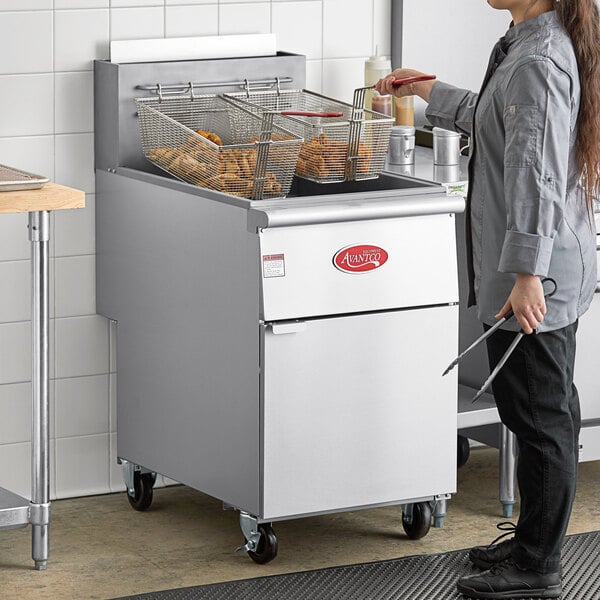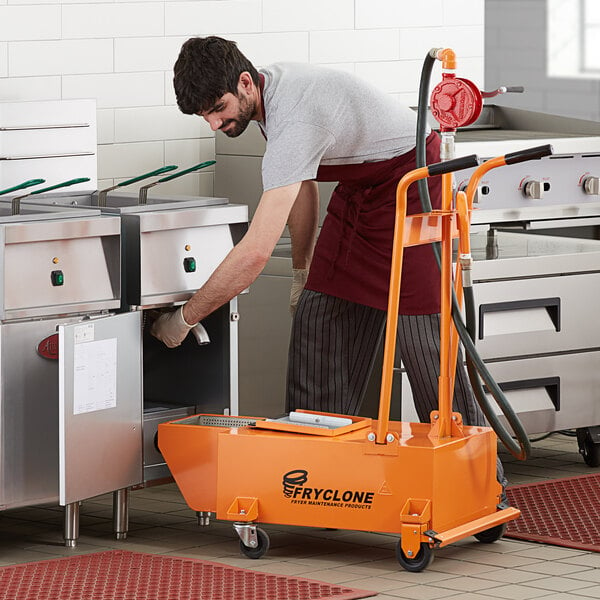In order to maintain a clean and efficient kitchen in restaurants, proper grease removal is of utmost importance. Fats, oils, and grease (FOG) are commonly produced during cooking and can lead to clogged pipes and sewage backups if not disposed of correctly. Grease buildup can occur in various areas of a commercial kitchen, including fryers, sinks, floor drains, and kitchen hoods. To ensure health and safety standards are met, as well as comply with local regulations, it is crucial to dispose of cooking grease properly. Options for disposal can range from throwing it in the trash to recycling it into biodiesel or donating it to organizations. To effectively manage and dispose of grease waste, the use of grease collection supplies such as traps, interceptors, and hoods is essential. By hiring grease collection services, restaurants can benefit from scheduled pickups of used cooking oil and grease, ensuring proper disposal. The advantages of utilizing these services include compliance with regulations, prevention of plumbing issues, and reduction of fire hazards. Overall, proper grease removal is not only important for preventing clogged pipes and costly repairs, but also for reducing environmental pollution.

The Importance of Proper Grease Removal
In a bustling commercial kitchen, proper grease removal is of utmost importance to maintain a clean and efficient environment. Fats, oils, and grease (FOG) are common byproducts of cooking in restaurants, and if not handled correctly, they can lead to clogged pipes and sewage backups. Therefore, it is crucial to understand the importance of proper grease removal in order to prevent these issues and comply with health and safety standards.
Prevention of Clogged Pipes and Sewage Backups
One of the primary reasons to prioritize proper grease removal in commercial kitchens is to prevent clogged pipes and sewage backups. Grease, when poured down sinks or flushed down drains, can solidify and accumulate within the plumbing system. Over time, this buildup can cause blockages, leading to costly repairs and disruptions in daily operations. By practicing effective grease removal techniques, such as using grease traps or interceptors, kitchen staff can significantly reduce the risk of clogged pipes and sewage backups.
Compliance with Health and Safety Standards
Complying with health and safety standards is essential for any restaurant or food establishment. Improper grease disposal not only poses a risk to the environment but also to the health and well-being of both employees and customers. Health regulations require the proper containment and disposal of FOG waste. By adhering to these standards and implementing effective grease removal practices, restaurant owners can ensure a clean and safe working environment.
Proper Disposal of Cooking Grease
Proper disposal of cooking grease is a fundamental aspect of proper grease removal. There are several options available for restaurants to dispose of their grease waste. One common method is to simply throw the grease in the trash. However, this can contribute to environmental pollution and is not recommended unless it is solidified and placed in sealed containers. Another option is to hire a grease collection service, which specializes in the proper disposal of used cooking oil and grease. Recycling the grease into biodiesel is another environmentally-friendly option, as it helps reduce the carbon footprint of the restaurant. Lastly, some organizations may accept donations of cooking grease for repurposing in various ways.
Prevention of Costly Repairs
By prioritizing proper grease removal, restaurant owners can also prevent costly repairs. Neglecting grease buildup can lead to major plumbing issues, such as clogs and backups, which may require extensive repairs and replacements. These repairs can be both time-consuming and expensive, resulting in disruptions to business operations and financial strain. By implementing proper grease removal techniques and investing in grease collection supplies, establishments can save themselves from unnecessary expenses and maintain the functionality of their plumbing systems.
Reduction of Environmental Pollution
In addition to preventing clogs and costly repairs, proper grease removal also plays a vital role in reducing environmental pollution. When grease is improperly disposed of, it can find its way into water sources, causing harm to aquatic life and contributing to ecosystem imbalances. By practicing responsible grease disposal methods, such as recycling into biodiesel or donating it to organizations, restaurants can significantly lessen their environmental impact and contribute to a healthier planet.
Sources of Grease Buildup in Commercial Kitchens
In commercial kitchens, grease buildup can occur in various areas as a result of everyday cooking operations. It is essential to identify these common sources of grease buildup in order to effectively manage and remove grease waste.
Fryers
Fryers are a major source of grease buildup in commercial kitchens. When foods are deep-fried, they release FOG into the air, which can settle on surfaces and equipment, including the fryer itself. Over time, this grease buildup can restrict the fryer's efficiency, compromising the quality of fried foods and increasing the risk of fire hazards. Regular cleaning and maintenance of fryers are essential to prevent excessive grease accumulation and maintain a safe and hygienic kitchen environment.
Sinks
Sinks are another area where grease can collect in commercial kitchens. When dishes, utensils, and equipment are washed, residual grease can be washed down the drains along with the wastewater. Without proper grease traps or interceptors, this grease can accumulate in the plumbing system, leading to clogs and backups. Regular cleaning of sink drains and the use of grease traps are crucial to prevent grease buildup and maintain smooth plumbing operations.
Floor Drains
Floor drains are often overlooked areas where grease can accumulate in commercial kitchens. During cooking processes or when cleaning the kitchen, water mixed with grease can flow into floor drains, resulting in grease buildup over time. This can not only cause plumbing issues but also create a slippery and hazardous working environment. Regular cleaning and maintenance of floor drains, along with the use of appropriate grease traps, can help prevent grease buildup and ensure workplace safety.
Kitchen Hoods
Kitchen hoods play a significant role in removing smoke, steam, and odors from commercial kitchens. However, they can also accumulate grease over time. As smoke and steam rise from cooking appliances, they pass through the kitchen hood filters, which can become coated with grease residue. If not cleaned regularly, these grease-laden filters can restrict airflow and increase the risk of fire hazards. Routine maintenance of kitchen hoods, including the regular cleaning and replacement of filters, is essential to prevent grease buildup and maintain a safe working environment.
Options for Disposing of Restaurant Grease
Proper disposal of restaurant grease is a responsibility that every establishment must undertake. There are several options available to dispose of grease waste responsibly, each with its own advantages and considerations.
Throwing it in the Trash
One of the simplest, but least environmentally friendly, methods of grease disposal is throwing it in the trash. However, it is crucial to note that liquid grease should never be poured directly into the trash, as it can leak and cause a mess. Instead, it should be solidified by allowing it to cool or by mixing it with absorbent materials such as cat litter before placing it in a sealed container. This reduces the risk of leakage and allows for proper containment. While this method may be suitable for small amounts of grease, it is not recommended for large volumes due to the potential for environmental pollution.
Hiring a Grease Collection Service
For larger establishments or those with significant grease waste, hiring a grease collection service is a preferable option. These specialized services provide scheduled pickups of used cooking oil and grease, ensuring that it is disposed of properly and in compliance with regulations. They often recycle the grease into biodiesel, thereby reducing the environmental impact and carbon footprint of the restaurant. Grease collection services offer a convenient and efficient means of grease disposal while ensuring adherence to health and safety standards.
Recycling it into Biodiesel
Recycling restaurant grease into biodiesel is not only an environmentally friendly option but also contributes to sustainability efforts. Biodiesel is a renewable energy source derived from biological materials, such as used cooking oil or animal fats. When converted into biodiesel, restaurant grease can be used as an alternative fuel source for vehicles and machinery. This option not only reduces the overall carbon emissions but also supports the development of sustainable energy practices.
Donating it to Organizations
In some cases, restaurant grease can be donated to organizations or facilities where it can be repurposed. For example, some animal rescues or farms may accept used cooking oil or grease for feeding purposes. Before donating, it is important to reach out to these organizations and ensure that they have the capacity and need for the donated grease. This option allows for the responsible disposal of grease waste while contributing to a worthy cause.
Grease Collection Supplies
Proper grease removal requires the use of appropriate grease collection supplies. These supplies play a crucial role in managing and disposing of grease waste effectively in commercial kitchens.
Grease Traps
Grease traps are one of the most essential grease collection supplies in commercial kitchens. They are installed in the plumbing system, usually under sinks or floor drains, and are designed to catch grease before it enters the wastewater system. Grease traps work by holding the wastewater long enough for the FOG to separate and rise to the surface, while allowing the remaining liquid to continue through the plumbing system. Regular maintenance and cleaning of grease traps are necessary to ensure their proper functioning and prevent grease buildup.
Grease Interceptors
Similar to grease traps, grease interceptors are larger-scale devices used to capture FOG waste from multiple sources, such as sinks and dishwashers. Grease interceptors are typically installed outside the building, below ground level, and can handle large volumes of grease waste. These devices are equipped with screens or baffles that trap the grease, allowing the remaining wastewater to flow freely. Due to their larger size, grease interceptors require more frequent maintenance and cleaning to prevent excessive grease accumulation.
Fryer Oil Pails
Fryer oil pails are containers specifically designed for the collection and disposal of used frying oil. They often come with a built-in spout or a filtering system that allows for easy pouring and separation of oil from food particles and sediment. Fryer oil pails are an efficient way to gather and store used cooking oil before it is disposed of or recycled. Proper use of fryer oil pails minimizes the risk of spills and contamination during oil disposal and simplifies the grease removal process.
Fryer Oil Shuttles
Similar to fryer oil pails, fryer oil shuttles are specialized containers used for the transportation and storage of used frying oil. They are commonly equipped with wheels or handles, allowing for easy maneuverability. Fryer oil shuttles come in various sizes and capacities to accommodate the specific needs of different commercial kitchens. These containers are designed to be leak-proof, ensuring the safe and hygienic transfer of used cooking oil for disposal or recycling.
Kitchen Hoods
Kitchen hoods, though primarily used for ventilation, also play a role in grease collection. Grease filters or baffle filters within the kitchen hood system help trap grease particles, preventing them from entering the exhaust system or accumulating in the ductwork. Proper cleaning and maintenance of kitchen hoods, including the regular replacement or cleaning of filters, are necessary to prevent excessive grease buildup and maintain the efficiency of the ventilation system.

The Role of Grease Collection Services
Grease collection services play a vital role in the proper management and disposal of grease waste in commercial kitchens. They provide a range of services specifically tailored to the unique needs of restaurants and food establishments.
Scheduled Pickups of Used Cooking Oil and Grease
One of the primary functions of grease collection services is to provide scheduled pickups of used cooking oil and grease. These services work with restaurants to establish regular collection schedules, ensuring that grease waste is promptly and efficiently removed from the premises. By having a reliable collection service, restaurants can maintain a clean and uncluttered kitchen environment while minimizing the risk of grease-related issues.
Proper Disposal and Compliance
Grease collection services specialize in the proper disposal of used cooking oil and grease. They ensure that the collected grease waste is disposed of in compliance with local regulations and in an environmentally responsible manner. This may involve recycling the grease into biodiesel or repurposing it for other uses. By utilizing the services of a professional grease collection service, restaurants can rest assured that their grease waste is being disposed of safely and in accordance with industry standards.
Prevention of Plumbing Issues
Grease collection services help prevent plumbing issues by removing grease waste from the premises on a regular basis. By eliminating grease from the plumbing system, the risk of clogged pipes and backups is significantly reduced. Grease collection services often work in tandem with the installation and maintenance of grease traps or interceptors, ensuring that the plumbing infrastructure is effectively protected from grease accumulation.
Reduction of Fire Hazards
Another responsibility of grease collection services is the reduction of fire hazards associated with grease buildup. Grease, when accumulated in kitchen hoods or exhaust systems, can become highly combustible, increasing the risk of fires. Grease collection services assist in the regular cleaning and maintenance of kitchen hoods, ensuring that grease filters are replaced or cleaned to maintain their effectiveness. By minimizing grease buildup and fire hazards, these services contribute to the overall safety and well-being of the kitchen environment.
Benefits of Hiring a Grease Collection Service
Hiring a grease collection service offers numerous benefits to restaurant owners and operators. These services go beyond the basic removal of grease waste and provide valuable advantages in maintaining a clean and compliant kitchen.
Compliance with Regulations
One of the key benefits of hiring a grease collection service is the assurance of compliance with regulations. Health and safety standards mandate proper disposal of grease waste, and failure to adhere to these regulations can result in fines or legal issues. By enlisting the services of a reputable and licensed grease collection service, restaurants can ensure that they are operating within the bounds of the law and fulfilling their obligations as responsible business owners.
Prevention of Plumbing Issues
Effective grease removal is essential to prevent plumbing issues such as clogged pipes, backups, and sewer line damage. Grease collection services work in conjunction with grease traps or interceptors, ensuring that the plumbing system remains clear and functional. By regularly removing grease waste from the premises, these services significantly reduce the risk of plumbing problems, saving restaurant owners from costly repairs and disruptions in operations.
Reduction of Fire Hazards
Grease buildup in kitchen hoods and exhaust systems can pose a serious fire hazard. Grease collection services play a critical role in ensuring the cleanliness and safety of these areas. Through regular maintenance and cleaning, these services reduce the risk of grease-related fires and protect the premises from potential damage. By investing in a grease collection service, restaurant owners can enjoy increased peace of mind knowing that fire hazards are being actively minimized.

Proper Grease Disposal to Prevent Issues
Proper grease disposal is essential to prevent a range of issues that can arise from the buildup and accumulation of FOG waste. By understanding the consequences of improper grease disposal and implementing appropriate measures, restaurant owners can avoid the following problems:
Prevention of Clogged Pipes
One of the most common problems associated with improper grease disposal is clogged pipes. When grease is poured down sinks or flushed down drains, it can solidify and accumulate within the plumbing system over time. This buildup restricts the flow of water, leading to slow drains, backups, and eventually, complete blockages. By disposing of grease waste responsibly and utilizing grease traps or interceptors, restaurant owners can prevent clogged pipes and maintain the functionality of their plumbing systems.
Avoidance of Costly Repairs
Neglecting proper grease disposal can result in costly repairs and replacements. When grease accumulates in plumbing systems, it can cause extensive damage that requires professional intervention. Repairing clogged or damaged pipes, replacing damaged fixtures, or addressing sewage backups can incur significant expenses for restaurant owners. By prioritizing proper grease removal, these unnecessary repair costs can be avoided, saving establishments both time and money.
Reduction of Environmental Pollution
Improper grease disposal contributes to environmental pollution, particularly in water sources. When grease is poured down sinks or flushed down drains, it can find its way into rivers, lakes, or oceans, contaminating these valuable resources. This pollution can have detrimental effects on aquatic life and disrupt the delicate ecosystems that depend on clean water. By properly disposing of grease waste through recycling or trusted collection services, restaurant owners can contribute to a cleaner and healthier environment.

 US Dollars
US Dollars